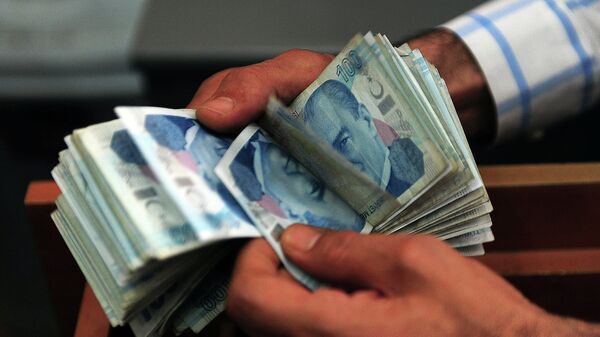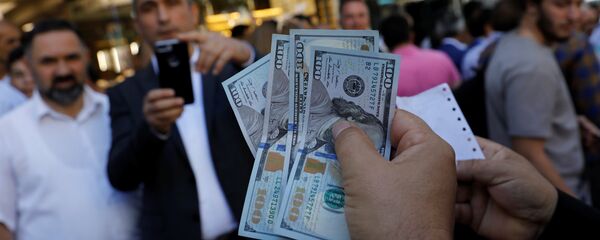Kristian Rouz — Prominent special interest groups representing US-Turkish businesses are calling for a bilateral meeting between US President Donald Trump and his Turkish counterpart Recep Tayyip Erdogan. Lobbyists hope the two presidents could reach a mutually-acceptable agreement to ease political tensions and resume business as usual.
Leaders from the American Turkish Council and Turkey-US Business Council have publicly urged talks between Trump and Erdogan. The lobbyists said the sides could coordinate a release of American pastor Andrew Brunson — whose detention in Turkey is the key sticking point in the countries' rapidly deteriorating bilateral relations.
READ MORE: US Uses Tariffs Punishing Other States for Political Gain — Turkish Opposition
"Only the two presidents can put this relationship back on track," Mehmet Ali Yalcindag of the Turkey-US Business Council said. "We need to end this before it strains and permanently damages the relationship."
Additionally, leaders of at least 250 companies doing business in both the US and Turkey — and represented by the aforementioned lobbyist groups — said the diplomatic spat has hampered investor confidence and impaired their own spending and development plans.
Despite the calls for diplomacy and mutual concessions, Trump said he would not give up on his plans to exercise maximum pressure on Turkey in order to force the release of Brunson. The US president also said he doesn't care if the diplomatic spat with Turkey hurts economic growth in the Eurozone or in other emerging markets.
"I think it's very sad what Turkey is doing. I think they're making a terrible mistake. There will be no concessions," Trump said.
The US president previously tweeted America's relations with Turkey aren't good "at this time," suggesting an unconditional release of Brunson could be a beginning of a diplomatic rapprochement.
Trump is also more than eager to assess his position in order to get NATO member Turkey in line with the White House's foreign policy agenda. Over the past few years, Turkey has distanced itself from the US diplomatically, not least due to what some experts have described as the rise of political Islam in Turkey.
READ MORE: 'We Won't Surrender': Erdogan Accuses US of Plotting 'Economic Coup' in Turkey
For example, Erdogan has labeled US allies Israel and Kurdish Peshmergas as "terror groups," and Turkey has also supported Islamic militias in Syria — despite the Trump administration growing increasingly skeptical of the so-called "moderate rebels."
"On the relationship with the United States, Erdogan's declaration that Washington is waging ‘economic war' on Turkey reflects just how toxic relations between the two countries have become over the last five years," Steven A. Cook of the Council on Foreign Relations wrote in a recent article in Foreign Policy.
In this light, the detention of Brunson appears to have become a mere indicator revealing the US and Turkey do not appear to share the same vision of the system of international relations and their respective roles in it any longer.
"I got that person out for him. I expect him to let this very innocent and wonderful man (Brunson) and great father and great Christian out of Turkey," Trump said.
Subsequently, the Trump administration's moves have affected foreign direct investment in Turkey, whilst the US tariffs against certain Turkish products added to the economic turmoil in that country. Moreover, several multi-billion dollar deals — including mergers and acquisitions in Turkey planned by US companies — have stalled.
"The United States is using its economic strength in a dangerous way for political gain and we don't agree with the use of sanctions for that reason. We can see direct impacts already," Howard Beasey of the American Turkish Council stressed.
And Ankara has already suffered a minor blow to its currency earlier this year — with this most recent diplomatic rift only making the problems worse. At present, the lira has lost over 40 percent of its dollar value.
"I'm not concerned at all. I'm not concerned. This is the proper thing to do," Trump said, discussing the economic effects of his Turkey policies.
Since the onset of this quarrel, several reports have speculated Turkey's possible exclusion from the dollar economy might eventually alienate this NATO member-state from the US politically as well.
READ MORE: US Policy of Containment, Thaw With Russia Caused US-Turkish Spat — Professor
Some have alleged that Turkey might seek closer business ties with America's political rivals, and actively participate in the development of an alternative system of international trade and financial relations.
At the same time, the White House appears to believe that Washington and Ankara don't share as much in common anymore anyway, as the main reason for Turkey's accession into NATO in the first place was its territorial proximity to the Soviet Union during the Cold War — a geostrategic factor hardly relevant at this point.






